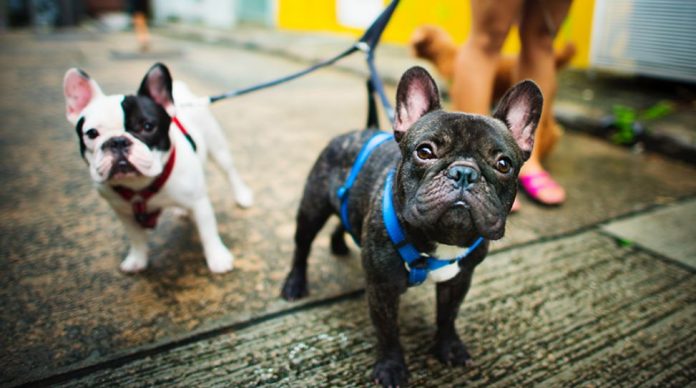After a hard day’s work, you may sometimes look at your pooch and wish you had it easy as they did. After all, they get three (free) square meals a day, a comfy bed, ZERO bills and plenty of belly scratches. Ahhh, that’s the life, right?
And yet our dogs can suffer severely with stress and anxiety – so much so in fact, that if left untreated, it can lead to serious behavioral issues and persistent psychological problems.
At FOMO, we’re all for happy wagging tails. So here we present the top eight signs of a dog in distress (with some pointers along the way as to what you could and should do about it.
Barely poops or getting all blocked up
Diarrhea and constipation can go hand-in-hand with anxiety. Like their owners, dogs have millions of receptors within their gastrointestinal tract. When a dog is stressed, these receptors react to the physiological response to fear by either speeding up, or slowing down, our digestive tracts.
Im-paw-tant pointer: With this indicator, it’s worth understanding that diarrhea or constipation is usually more likely to be linked with illness or food intolerance – so any persistent stomach upsets should warrant an urgent trip to the vet (when we say persistent, we’re talking for more than 48 hours or so). This is especially true if you spot blood in their vomit or stools.
“Favorite dog treat? No thank you” – Your dog’s appetite dramatically decreases
This one can be a BIG red flag. After all, what dog would willingly turn their CBD dog treats or food down? In the most basic sense, a loss in appetite in dogs can be compared to how humans lose weight during stressful times of their life. If this has happened with your dog, think about whether there have been any new stressors recently – such as moving home, a new baby or a change in routine. You should also think about giving your vet a call – just to ensure there’s no underlying illness that could explain their dip in appetite.
“Just leave me alone!” – Your dog isolates himself
It’s pretty natural for any dog to want to spend time alone occasionally. However, when this becomes more regular, with you pup removing himself from human or canine company for hours on end, it could be an indicator that they are anxious or sick. To rule out illness, it may be worthwhile checking in with your veterinarian.
Your dog destroys… EVERYTHING!
In more boisterous breeds, dogs routinely attempt to calm their nerves themselves by chowing down on furniture, shoes, toys and even by biting or licking their own body! If you spot these signs, consider the immediate circumstances leading up to this behavior; had they been left alone for a long time? Has an unfamiliar guest popped round?
Yawning – Yup, it’s not just a sign of tiredness
It might seem odd, but yawning can be a symptom of stress. When a dog feels anxious, their body enters flight or fight mode.
Their heart rate increases, they breathe more quickly and their muscles tighten. To assist these processes, your pup’s body needs more oxygen, which is gained by taking deep, protracted breathes in the form of yawning.
A stressed yawn is typically observed alongside other behaviors, such as isolation and…
Pinned ears and panting
Some dogs seem to ‘look’ worried – a key indicator of which can be pinned ears – where their ears pull back and sit flusher to their head. They may also pant in reaction to fear, anxiety or stress.
A warning sign to look out for in a stressed, panting dog is when they suddenly close their mouth; this could be a signal that they’re reaching peak stress, and preparing to bite.
“Pass me the brush!” – Your pup sheds his hair. A LOT, of hair.
Ever noticed how much fur your dog leaves behind at the vets? You may have thought that you didn’t notice just how much they shred until you were under the bright vet lights. But actually, shedding hair is a reaction to anxiety. This can be as immediate as being in the vet’s waiting room, or it could be more gradual, in response to a big life event such as moving, adopting another pet or a family member moving out.
Licking (and licking and licking!) their nose and lips.
Dogs are forever attempting to communicate using body language, it’s just that most humans aren’t clued up as to what action holds what meaning.
In the case of a dog who excessively licks their nose and lips, this typically shows you that they’re feeling a bit uneasy.






















